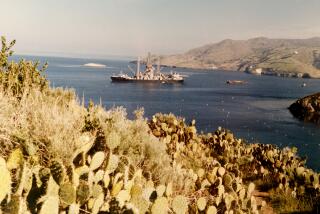TV REVIEW : ‘Operation Urgent Fury’ Looks at Invasion of Grenada
- Share via
“Operation Urgent Fury,” the title of tonight’s typically provocative installment of “Frontline,” was also the code name for the invasion of Grenada, a quick act of U.S. interventionism in 1983 that, its supporters would argue, surgically--and prudently--removed a small but strategically ominous communist malignancy from the Caribbean.
The invasion was considered by conservatives as the foreign policy triumph of President Reagan’s first term. But, not surprisingly, liberal investigative reporter Seymour Hersh--who wrote and narrates “Frontline’s” critical chronology of what became the first major U. S. military action since Vietnam--offers a differing view (at 9 p.m. on Channel 15, 10 p.m. on Channels 28 and 50).
Early on, Hersh asks two rhetorical questions: Were the 600 American medical students living on the island ever really in imminent danger from the Marxists running Grenada (the putative reason for the invasion), and did the Reagan Administration seriously try to resolve the crisis by diplomatic means?
The documentary’s answer to both questions is a resounding no, based on interviews with the chancellors of the medical school and with U. S. students who were there during the invasion, as well as with former Grenadian officials and ex-U.S. State Department staffers.
Invasion footage and statements by U.S. armed forces personnel--including the three-star general who ran the operation--also buttress the validity of two other claims made by Hersh. He says that “Operation Urgent Fury” is a story about “the dismal failure” of U.S. intelligence agencies to provide basic information about Grenada to the military and “about a hastily planned military operation” whose bumbling confusion jeopardized the safety of the 600 students it was purportedly rescuing.
Throughout the hour, Hersh and producer Mark Obenhaus effectively mine a great deal of irony by juxtaposing the facts as remembered by various invasion participants with the cheery chauvinisms made at the time by Reagan.
“Operation Urgent Fury,” which is more anti-Reagan than it is anti-interventionist in principle, ends without any mention of the large caches of Cuban-supplied weapons that were subsequently uncovered there. Also, little skepticism is directed at the veracity of statements made by Grenadian government officials (Reagan’s “communist thugs”), and few details are provided about the lack of basic freedoms they allowed their subjects.
But even after discounting for Hersh’s biases, “Frontline” presents a pretty strong case that the Reagan Administration was bound and predetermined to invade the island and that the United States, as one conservative military expert points out, was lucky it was picking on a fourth- or fifth-rate opponent.
More to Read
The complete guide to home viewing
Get Screen Gab for everything about the TV shows and streaming movies everyone’s talking about.
You may occasionally receive promotional content from the Los Angeles Times.





